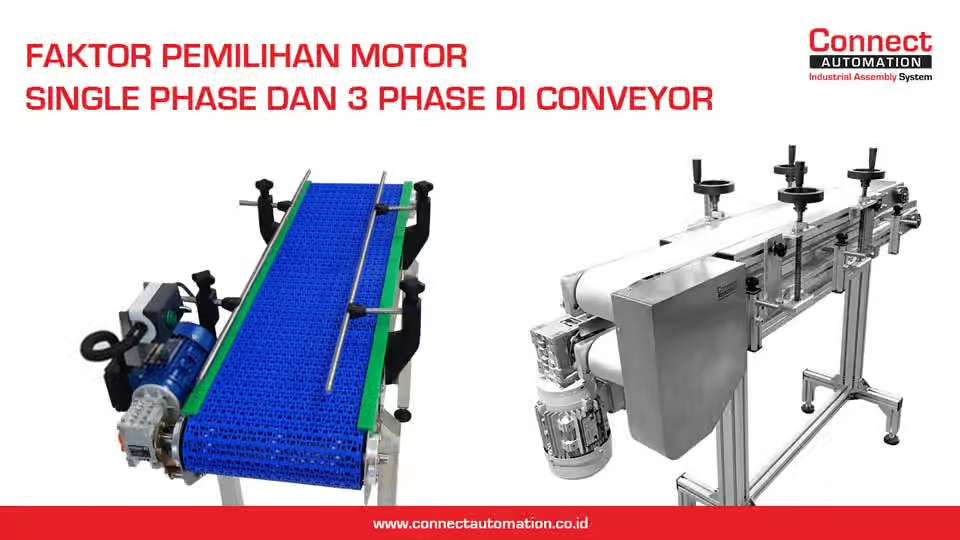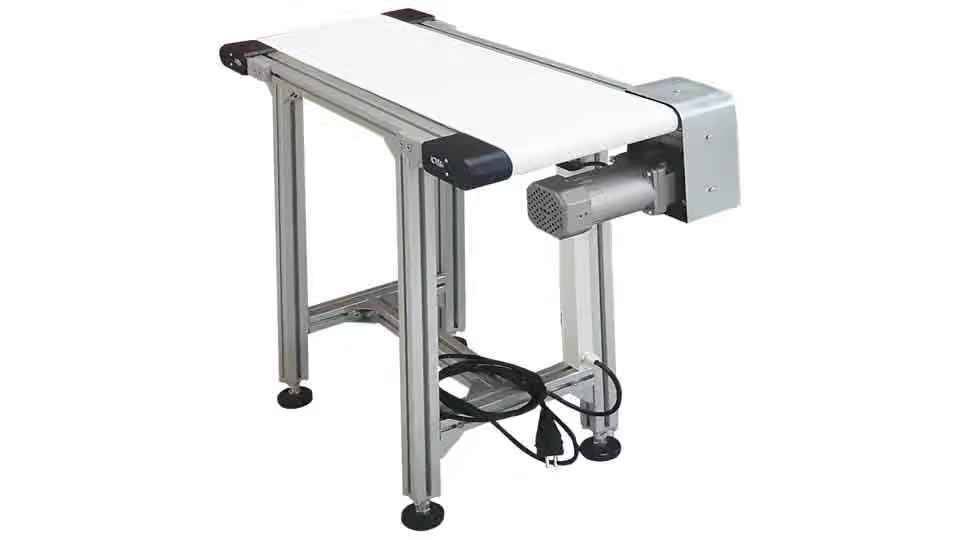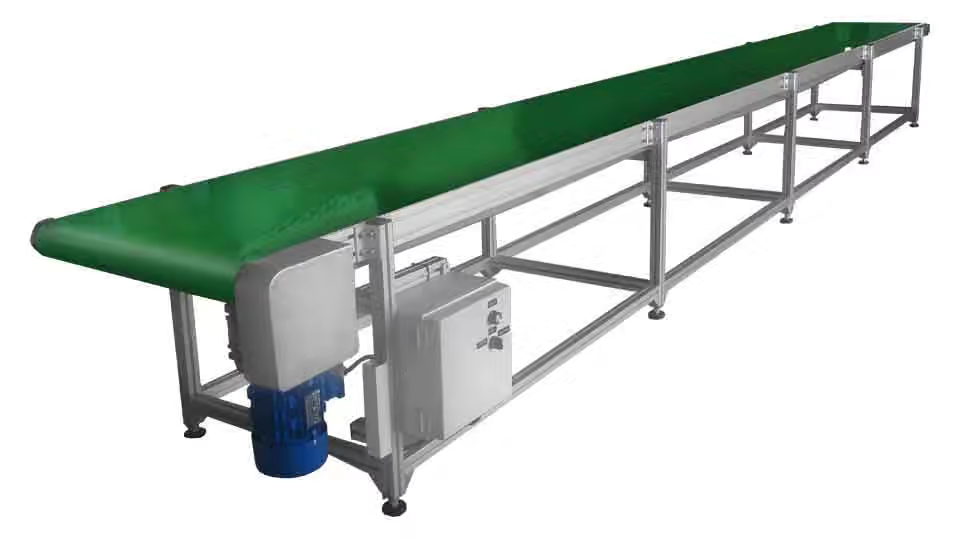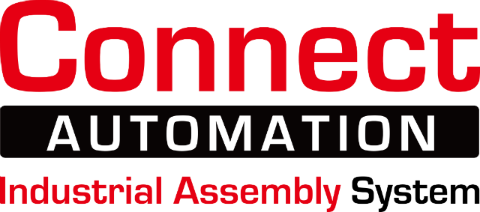PT. Environeer
031-99858624 (Surabaya), 021-8935060 (Jakarta)
Choosing Between Single and 3-Phase Motor for Conveyors

Difference between Single Phase and 3 Phase Motor on Conveyor Machine
Phase is a type of cable circuit that allows voltage to flow from a power source to a tool or machine. The types of phase are 1 phase and 3 phase for motors provided by Connect Automation. The difference between 1 phase and 3 phase is in the wiring harness and voltage limit. 1 phase has 1 neutral line and 1 power line that supports voltages up to 230V while 3 phase has 3 power lines so that it can support voltages greater than 1 phase, namely up to 415V.Single Phase and 3 Phase Motor Selection Indicators for Conveyors
The power source factor is often a user consideration for choosing a conveyor motor. Based on these conditions, industries in Indonesia prefer to use single phase motors compared to motors with 3 phases, because only to adjust the existing power source. Many conveyor users still do not fully understand what factors must be considered in choosing a conveyor drive motor. The discussion in this article is important for consideration in motor selection, so that the selection of the motor used for the conveyor is correct and can increase the productivity of your industry. Here are the differences:Single-Phase Conveyor Motor
Single phase motor functions as a converter of electric current into power that is able to drive machines (equipment) with 1 phase current (phase). The resulting voltage reaches 220 Volts to 240 Volts.
Single phase motors require additional circuits because their power supply connected to alternating current (AC) motors does not produce magnetic field rotation. The single phase motor voltage supply fluctuates or in other words the power output from the single phase supply is not constant.
Conveyors that use single phase motors will be very suitable for product transfer processes with light loads. Single phase uses one electrified cable and a neutral cable in the power distribution process.

Producted Conveyor by Connect Automation using 1 Phase Motor
3-Phase Conveyor Motor

Produced Conveyor by Connect Automtion using 3-Phase Motor
The 3 phase motor is able to produce a larger electric current, compared to 1 phase. The voltage level reaches 380 volts, and can drive machines (large tools) that require greater electrical power. With this comparison, industries with a larger scale will choose a 3 phase motor.
The power output of this 3 phase comes from one neutral cable and three conductor cables. The voltage coming out of the 3 phase motor reaches 415v. This makes the driving force of the conveyor with a 3 phase motor greater than the single phase which only reaches 230v.
In the wiring of a 3-phase electric dynamo (motor) or 3-phase motor, there are usually 2 choices, namely the motor is connected star or delta relationship, indeed this choice depends on the load to be used.
The need for a 3 phase motor conveyor is actually more suitable for product transfer in industry. Because the power released by the 3 phase motor is greater than the conveyor with a single phase motor.
However, from the two explanations above, we must understand when to use single phase and when to use 3 phase for conveyor motors. The following summarizes 3 important factors in choosing the right conveyor motor to increase the productivity of your industry.
Product Weight
We have discussed the weight of the conveyor in the selection of conveyor belts. We will continue to discuss product weight as a major factor in choosing a conveyor motor in this article.
"The heavier the product, the greater the energy required. It also applies to the total weight of the product on the conveyor. The greater total weight of the product, the more powerful a conveyor motor is needed for the transfer process"
For medium-light duty, you can use a conveyor with a single-phase motor. Then you can use a 3-phase motor conveyor for medium-heavy duty needs. However, it is possible to use a 3-phase motor conveyor for medium-light duty. On the other hand, it is not recommended to use single-phase for medium-heavy duty needs.
Conveyor Dimension
This point is towards the length of the conveyor. The length of a conveyor depends on the needs of its use. The longer the required conveyor, the longer the conveyor belt is used.
"Long conveyor belts require great power to move them, so a 3-phase motor will suit these conditions. However, it is possible to use a single-phase motor with a long conveyor belt. The difference will be seen in the speed of the conveyor itself"
The thickness of the conveyor belt can also be a consideration in determining the conveyor motor. This consideration is not as significant as the length of the conveyor belt, but you need to discuss this further with the team or with a professional to determine the proper conveyor motor.
Power Source
The power source is the main reason for users to choose conveyor motors. Generally, the socket in Indonesia is for single-phase. So that many conveyor users tend to adjust to the power source they have compared to considering the previous two points.
However, this condition is unavoidable because the sockets in Indonesia are generally single-phase. We can fulfill large power requirements with single-phase socket conditions by installing an inverter on the plug.
Choosing a Conveyor Motor
Choosing a conveyor motor between single-phase or 3-phase is about the needs and practicality of your industrial production line. It is not only on one factor but also considers other factors in choosing a conveyor motor. Because there is an investment value in the conveyor motor that you choose.
There are at least three factors that you must consider in choosing a conveyor motor, including product weight, conveyor dimensions, and also the power source. Identify your needs by considering these three factors to choose the proper conveyor motor for your industry.
Sales Engineer Connect Automation can provide recommendations for the choice of conveyor motor that is right for your needs. We have experience fulfilling industrial needs, one of which is the need for conveyors at home and abroad. Connect Automation is present in Surabaya, Semarang, and Jakarta.
Why should Connect Automation?
Connect Automation is a specialist supplier of industrial solutions such as belt conveyors, roller conveyors, workstations, safety guarding, cover machines, and other necessities. We keep improving the quality of our products and services to maintain the trust of our stakeholders.
Connect Automation has obtained and maintained the ISO 9001:2015 Quality Management System certificate since 2017. It shows that we have been trusted by many large companies as our commitment as an industrial solutions provider that keeps on-time delivery, always providing quality products and professional services.
Tell us your conveyor needs and get special price offers only at Connect Automation
About Us
Connect Automation specializes in providing automation solutions, including conveyor systems, to improve efficiency across various industries. The company delivers cutting-edge technology to help organizations automate tasks and optimize workflows. Connect Automation helps businesses reduce manual efforts, boost productivity, and achieve better outcomes. With a customer-focused approach, the company designs tailored solutions to ensure smooth and effective automation transitions for long-term success.
Connect Automation specializes in providing automation solutions, including conveyor systems, to improve efficiency across various industries. The company delivers cutting-edge technology to help organizations automate tasks and optimize workflows. Connect Automation helps businesses reduce manual efforts, boost productivity, and achieve better outcomes. With a customer-focused approach, the company designs tailored solutions to ensure smooth and effective automation transitions for long-term success.
Cikarang Store
Kawasan Industri Jababeka Tahap 1, Jl. Jababeka II D Blok C14L Cikarang, Indonesia (17530)
(021) 893 5060 Google Maps
Kawasan Industri Jababeka Tahap 1, Jl. Jababeka II D Blok C14L Cikarang, Indonesia (17530)
(021) 893 5060 Google Maps
Surabaya Store
Rungkut Industri III, No. 37, Rungkut Menanggal, Kec. Gn. Anyar Surabaya, Indonesia (60293)
(031) 9985 8624 Google Maps
Rungkut Industri III, No. 37, Rungkut Menanggal, Kec. Gn. Anyar Surabaya, Indonesia (60293)
(031) 9985 8624 Google Maps
